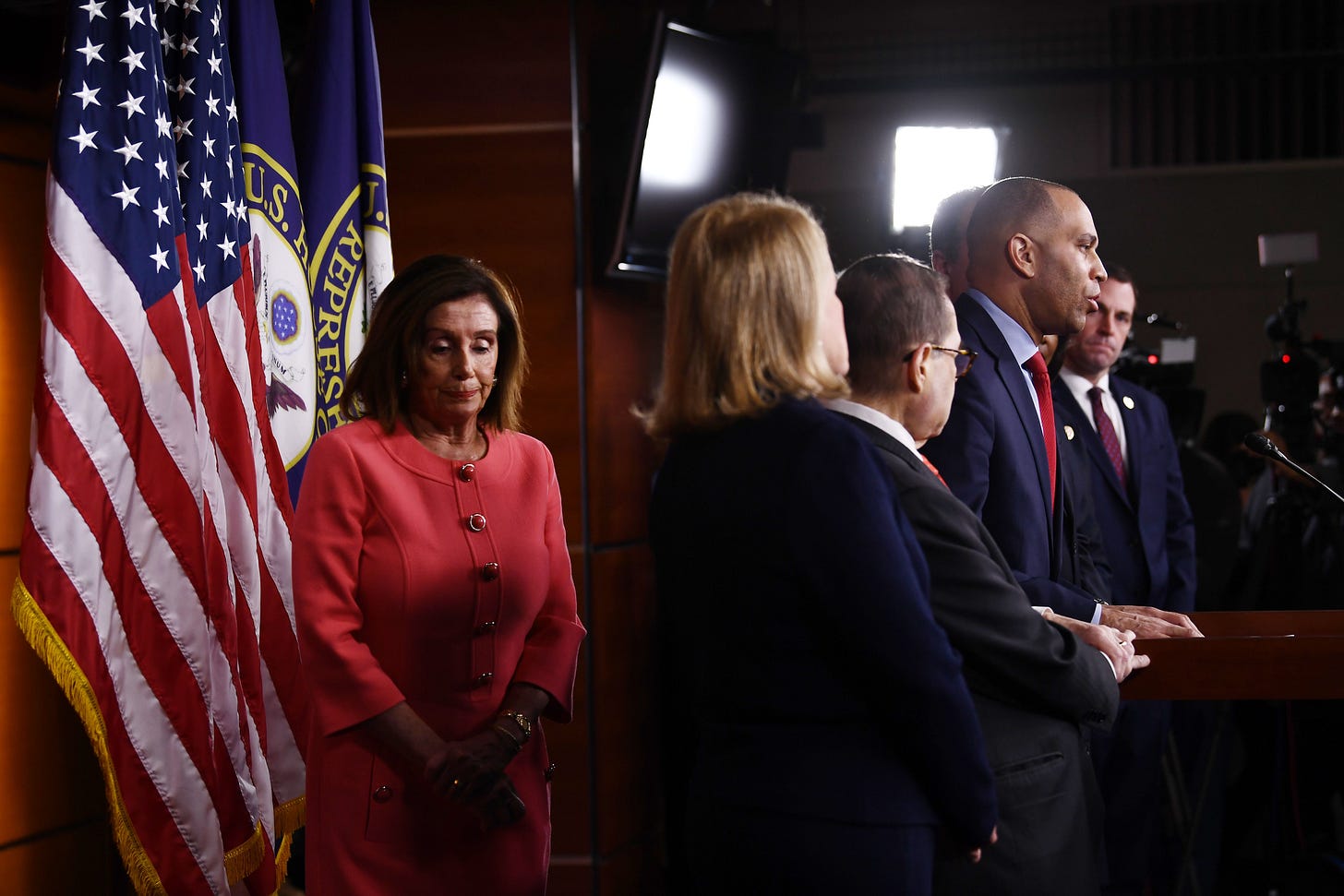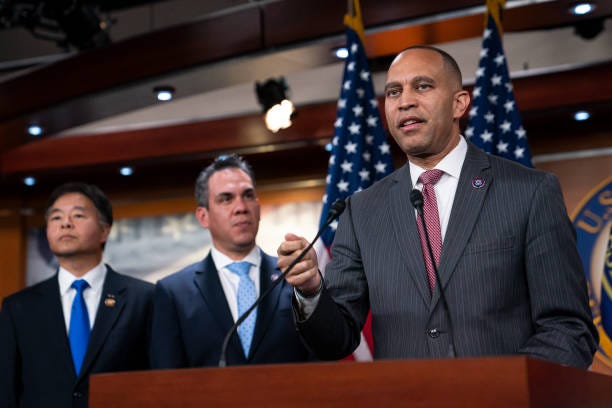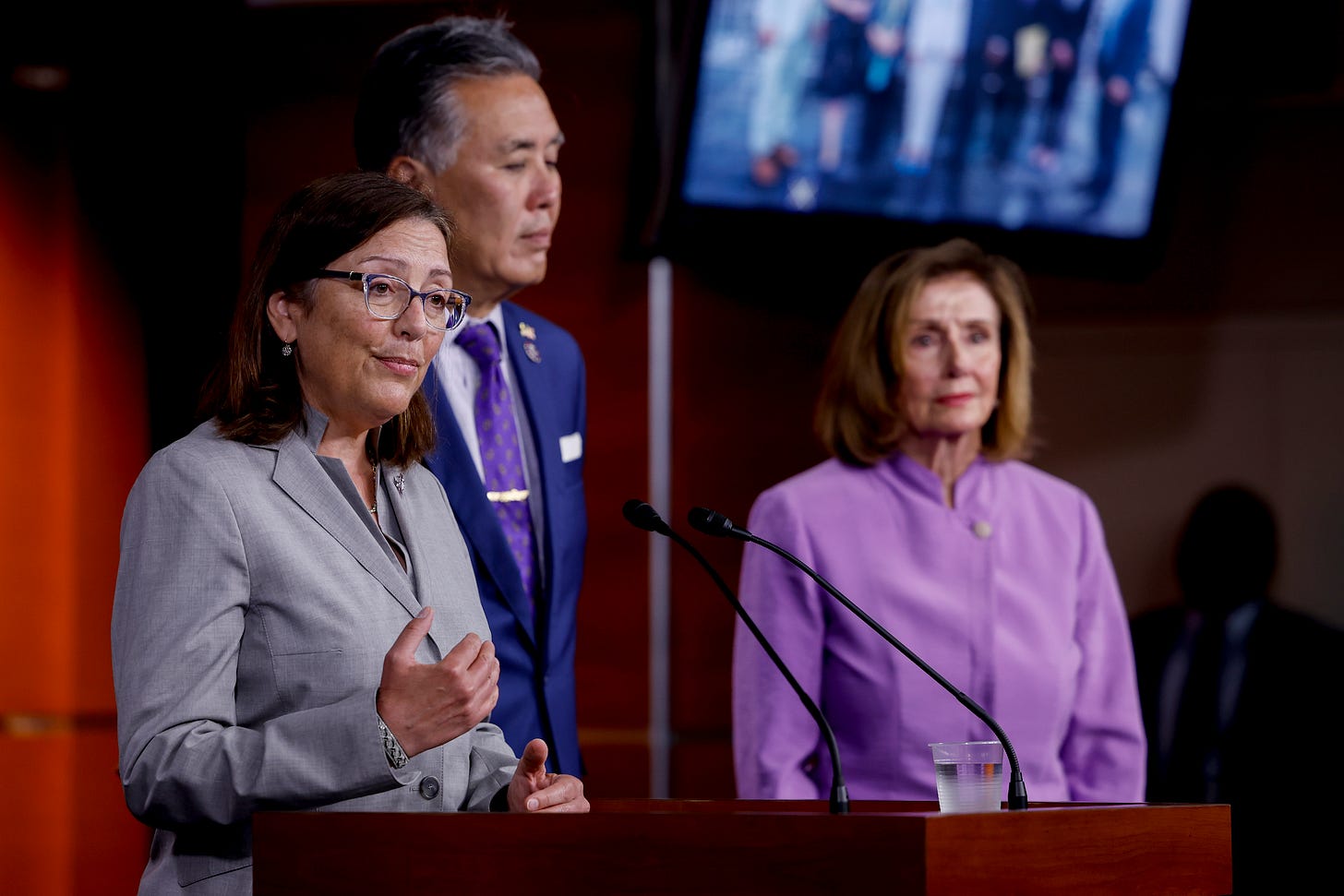Will Jeffries Tackle the Gender Imbalance in Leadership?

At the end of November, House Democrats made a smooth transition in leadership after Speaker Nancy Pelosi, the first woman to serve as Speaker, stepped down and welcomed Hakeem Jeffries, the first Black person in the nation’s history to lead either party in Congress.
The plan was well calculated and coordinated after Pelosi and her top deputies — Majority Leader Steny Hoyer (MD) and Majority Whip Jim Clyburn (SC) — announced earlier in the month that they would step out of the top three spots to make way for fresh leadership. Unlike the Republican Party, which is embroiled in ongoing turmoil over who will lead their party, the Democratic caucus internally defused several potential conflicts that could have divided its members.
Rep. Pramila Jayapal (WA), was considered to be an early contender for the No. 2 slot (Minority Whip), but decided to run for re-election as Congressional Progressive Caucus Chair instead of pursuing a caucus-wide leadership bid. Rep. Adam Schiff’s (CA) decided to drop his bid for the No. 1 leadership spot as he focuses on an upcoming Senate run in California.
Rep. Joe Neguse (CO) was convinced to stay in his position as House Democrats’ messaging arm and was elected chair of the Democratic Policy and Communication Committee (DPCC), instead of a possible challenge to Jeffries. This makes Neguse the highest ranking member from Colorado in years and the second Black man in the upper echelon of House Leadership.

Rep. Pete Aguilar, who previously served as the Democratic Caucus Vice-Chair has now moved up to Democratic Caucus Chair and Rep. Steny Hoyer will now be replaced by Katherine Clark (MA) as Minority Whip. The only thing that remains for Democrats to iron out is the replacement of Sean Patrick Maloney (NY) as the head of the Democratic Congressional Campaign Committee (DCCC).
Maloney, who was in charge of the national Democratic campaign arm, had the worst individual performance of any politician in his home state of New York in this last Midterm Election. He not only lost his race, but congressional Democrats significantly underperformed in New York more than in any other state in the country. Many mistakes were made by Maloney, but one of the most significant was a lack of cultivating modern grassroots support in exchange for chasing larger, less impactful donations.
With the impending 2024 Presidential Election on the horizon, Incoming House Minority Leader Hakeem Jeffries will need to nominate someone to lead the DCCC through this next phase, who can right all of the many wrongs of Maloney. The first, most obvious correction, would be to nominate a woman of color.

An approach like this from Jeffries would both acknowledge the lack of gender diversity within the incoming upper House Democratic leadership ranks and correct the current trajectory of two male candidates, California Reps. Ami Bera and Tony Cárdenas, who have already publicly declared their intention to seek the post.
Jeffries met with Bera and Cárdenas in early December, but nothing in the new leadership rules requires the Democratic leader to nominate a DCCC candidate who is publicly seeking the role. It also seems likely that if the House Democratic Caucus wanted Bera or Cárdenas, its members probably wouldn’t have voted to change the rules and one of these two men would already have the appointment.
Someone who seems perfectly poised to check many of the necessary boxes and take the reins is outgoing New Democrat Coalition Chair Suzan DelBene (WA), who just won reelection by 27 points. DelBene’s district also appears to be safe, unlike Maloney’s.

DelBene has also spent time leading the New Democrat Coalition, which touts a progressive attitude that highlights “innovation and growth.” Moreover, a substantial number of newly elected Democrats, who flipped previously red seats to blue, are joining the “New Dems” and their center-left approach. This movement seems to suit a lot of Democratic politicians on the front lines.
When asked about whether she had any interest in the DCCC position, Del Bene said, “You know, this is a decision made by the leader, and so I think if you have any questions about it, you should talk to him.” When pressed further about the gender imbalance in newly elected Democratic Leadership, DelBene doubled-down on her response saying: “I’m always excited to see women in leadership, but this particular decision is up to Leader Jeffries.”

Incoming House Minority Whip Katherine Clark (MA) is currently the only Democratic woman who is confirmed to serve in high leadership in this next 118th Congress. After having such a prominent and successful woman in the lead Speakership role for two decades, replacing Maloney with another man would only create more of a gap in the gender inequity of the House.
Jeffries is expected to make a decision on his nomination as early as this week.
Amee Vanderpool writes the SHERO Newsletter, is an attorney, published author, contributor to newspapers and magazines, and an analyst for BBC radio. She can be reached at avanderpool@gmail.com or follow her on Twitter @girlsreallyrule.
Paid subscriptions and one-time tributes embedded in each article allow me to keep publishing critical and informative work that is sometimes made available to the public — thank you. If you like this piece and want to support independent journalism further, you can forward this article to others, get a paid subscription or gift subscription, or donate as much as you like today.



